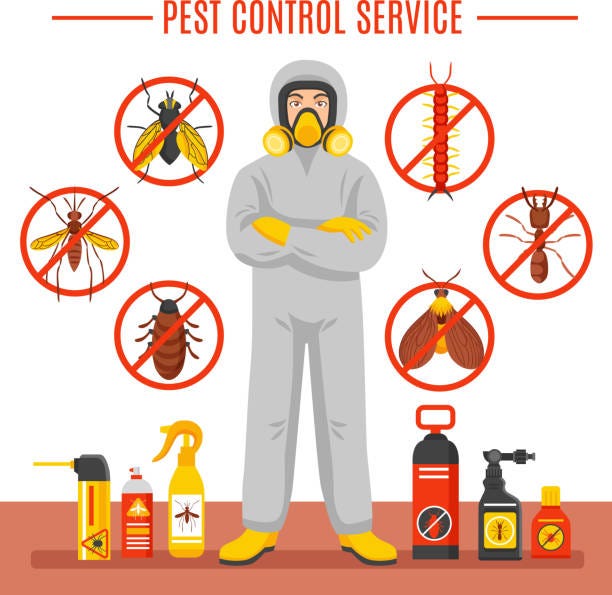Orem Pest Control Solutions: Protecting Your Home, Inside and Out
Orem Pest Control Solutions: Protecting Your Home, Inside and Out
Blog Article
Discovering the Various Types of Pest Control Techniques and Their Applications
Parasite control is an important aspect of keeping a healthy and risk-free setting, whether it be in property, commercial, or farming settings. From chemical techniques that target specific pests to organic techniques that harness natural predators, the world of pest control is varied and large.
Chemical Pest Control Techniques
Chemical pest control methods are extensively made use of in farming and insect administration to efficiently get rid of or regulate pest invasions. These techniques entail the use of chemical compounds, such as pesticides, herbicides, and pesticides, to eliminate or lower parasite populaces that posture a threat to plants, animals, or human health.
While chemical parasite control methods can be highly effective in handling pest populaces, they additionally raise worries about prospective environmental and health and wellness dangers. Incorrect use or overuse of chemical pesticides can cause air pollution of air, dirt, and water, hurting non-target microorganisms and triggering long-term eco-friendly damages. Additionally, duplicated exposure to chemical deposits may present wellness risks to farmworkers, consumers, and wildlife. It is essential to adhere to safety standards, utilize incorporated pest administration approaches, and take into consideration alternate methods to lessen the unfavorable influences of chemical parasite control strategies.
Organic Parasite Control Techniques
 Biological bug control approaches use living organisms to manage and lower parasite populations in a ecologically pleasant and sustainable fashion. One usual approach is the release of ladybugs to fight aphids in yards, as ladybugs are natural predators of these harmful insects.
Biological bug control approaches use living organisms to manage and lower parasite populations in a ecologically pleasant and sustainable fashion. One usual approach is the release of ladybugs to fight aphids in yards, as ladybugs are natural predators of these harmful insects.
Organic bug control techniques provide several benefits over chemical techniques. In general, biological parasite control approaches provide a natural and effective choice to traditional chemical treatments, advertising a well balanced community and much healthier atmospheres.
Physical Pest Control Approaches
Making use of physical methods to manage insects involves making use of non-chemical or mechanical ways to take care of and alleviate bug problems successfully. These approaches count on physical barriers, traps, and various other methods to deter and eliminate parasites without using harmful chemicals. One common physical insect control approach is the installation of internet, displays, or fences to block bugs from entering specific areas. This approach is particularly efficient in shutting out pests and little pets from buildings or yards.
One more physical approach is the use of traps, such as snap traps for rats or scent catches for insects. These traps purpose to capture parasites without presenting any threat to human beings or the environment. Furthermore, physical control methods can consist of methods like handpicking pests off plants, utilizing vacuum cleaner tools to remove bugs, or employing heat therapies to remove bed pests and various other bugs in ravaged locations.
Integrated Bug Monitoring Strategies
Carrying out a holistic approach to pest management, Integrated Pest Administration (IPM) methods intend to incorporate different effective techniques to regulate and protect against bug problems while minimizing environmental impact and ensuring sustainable pest control practices. IPM entails the integration of multiple control approaches such as organic control, hop over to these guys cultural methods, mechanical control, and the careful usage of chemicals.

Moreover, IPM highlights the importance of monitoring and analyzing pest populaces to figure out the most suitable control approaches. By implementing IPM strategies, insect control initiatives become a lot more targeted and reliable, minimizing the dangers linked with extreme pesticide use and promoting long-lasting pest monitoring solutions.
All-natural and Organic Pest Control Options

One prominent organic bug control technique is neem oil, obtained from the seeds of the neem tree, which functions as a repellent and interferes with the websites growth and development of bugs. Diatomaceous earth, a natural silica-based powder, is one more efficient natural insect control alternative that works by dehydrating insects upon get in touch with. By including all-natural and natural insect control alternatives into insect administration approaches, people can successfully manage bugs while minimizing damage to the environment and advertising lasting techniques.
Conclusion
Finally, different bug control techniques such as chemical, biological, physical, incorporated insect monitoring, and natural options are offered for effectively handling parasite infestations. Each method has its very own benefits and applications depending upon the kind of parasite and the environment. By understanding the different kinds of bug control methods and their applications, individuals can make informed choices on the most ideal strategy to control insects and safeguard their residential property.
Chemical parasite control methods are widely made use of in agriculture and parasite monitoring to properly remove or regulate pest problems - Orem Pest Control. Natural pest control approaches involve utilizing organic control agents, such as parasites or killers, to handle bug populations. By including organic and all-natural insect control choices right into parasite management approaches, people can properly manage insects while decreasing damage to the atmosphere and promoting sustainable practices
In conclusion, various parasite control strategies such as chemical, biological, physical, incorporated insect administration, and all-natural choices are offered for properly taking care of pest problems. By understanding the different types of parasite control strategies and their applications, people can make enlightened choices on the most suitable approach to control bugs and safeguard their building.
Report this page